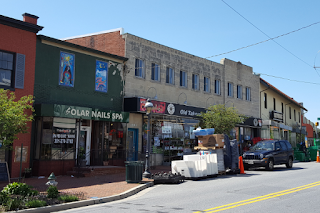A Tax Break for Takoma Park Businesses?
An Old Takoma business, S&A Beads, has made just that request to the city council. The council deferred the question to a future worksession, but let’s get a jump on the council and consider it now.
Let’s start with facts —
 |
| Do strong businesses need low taxes? |
All companies that operate in Takoma Park must pay PPTs on their equipment and inventories, if any, that are located here in Takoma Park. That includes companies incorporated outside Maryland — Walgreens, Aldi, Advance Auto Parts, and Starbucks, for example — and incorporated home businesses. Businesses, including my own consulting company, must file annual returns with the Maryland Department of Assessments and Taxation.
PPTs are the only city tax levied directly on every incorporated city business.
I mined PPT data from the Montgomery County Personal Property Tax Web site — business PPT assessments and bills are public records — and count 557 fiscal year 2016 (FY16) payers.
Of the 557, 180 businesses paid inventory taxes in FY16. Their inventory taxes contributed an estimated $152,323 to the city’s general fund. That’s about 39% of the total FY16 business PPT liability, $387,521 by my calculation if you exclude PPTs paid by public utilities.
Focusing on the inventory tax —
Five Takoma Park businesses paid inventory tax of over $5,000 in the current fiscal year:
- Advance Auto Parts: $24,419
- US Medical Innovations (at Carroll & Eastern): $14,333
- Walgreens, $13,439
- RS Legacy Corporation (Radioshack): $5,611
- TPSS Co-op: $5,547.61
One more fact —
If the city eliminates or reduces the inventory tax, the council will have to either cut programs or make up the revenue through other means.
Where does the money go?
Business property taxes — PPTs and real property taxes paid by commercial real-estate owners — funds city operations and programs that benefit the businesses and their patrons and employees: police, roads and sidewalks, parks, street lights and street cleaning, and so on. They fund city business and economic development activities including the city’s annual subsidies to the Old Takoma Business Association (OTBA) and the Takoma-Langley Crossroads Development Authority (CDA).
OTBA received a $37,000 subsidy in FY16. The CDA’s FY16 subsidy was $30,000.
Is the inventory tax fair? Is it wise?
Does Walgreens get fair value from the $16,320.57 the company paid in Takoma Park PPTs in FY16, and for the $15,330.40 (net of a $12,572.35 enterprise-zone tax credit) that landlord JBG Retail paid in real-property taxes? Does the House of Musical Traditions fairly benefit from FY16’s $1,086.40 city PPT payment (of which $1,061.13 is inventory tax) and $2,144.03 in city real-property taxes?
My unquantified reaction is yes.
Personally, my wife and I paid the city $2,860.65 in property taxes on our home, this past year. Most residents pay city taxes, and I’m not dissatisfied with the type and level of services delivered. But should homeowners pay more, another 3/4 cent in real-property tax rate, in order to compensate for elimination of the inventory tax? I’m not feeling that I, personally, should pay to lighten the tax burden of large businesses such as Advance Auto Parts and Walgreens.
Historically, the city council has agreed. This year isn’t the first the inventory tax has come up for discussion.
In 2010, when I was on the OTBA board, I headed an ad-hoc committee that looked into the question. Again mining county tax records, I found that in 2009, the Takoma Park inventory tax totaled $104,544. OTBA used that figure — and real property taxes and non-inventory PPTs — to argue for the annual subsidy that OTBA has now received for several years, and that the CDA now also receives.
Are there alternatives to eliminating the inventory tax?
Yes. The city could cut its personal property tax rate, $1.55 per $100 assessed value in FY16. Councils since FY09’s increased the rate in steps from $1.45/$100 that year which cutting the real-property tax rate from $0.605 per $100 assessed value in FY09 to $0.585 in FY16. I believe the council should realign the PPT rate with the real-property rate.
My call